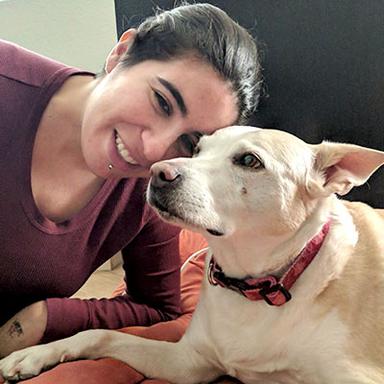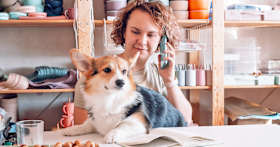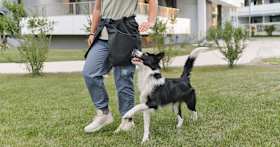Does Dog Daycare Help With Socialization?
The benefits of doggy daycare depends on your pup. Here’s how to weigh the pros and the cons.
The benefits of doggy daycare depends on your pup. Here’s how to weigh the pros and the cons.
by Daniela Lopez, | August 11, 2025

Sean Locke / Stocksy
Dog daycare can help with socializing your dog, and it can be a great alternative to leaving your pet home alone all day while you’re at work. But for some dogs, being in a big, high-energy group isn’t the right fit: These types of dogs might thrive in smaller, more controlled settings. And for young puppies needing exposure to new experiences and animals, daycare is not recommended. Find out what socialization is, and if your dog is the right fit for doggy daycare.
Before deciding if dog daycare is good for your pup’s socialization, let’s clarify what socialization means. When you think about socialization, you might think about making new friends and socializing. But that’s not what socialization is all about.
Socialization in dogs refers to exposing them to positive interactions with new people, places, textures, sounds, and situations. It’s about helping your dog get used to new experiences in a way that’s not scary. So when your dog sees someone walking down the street wearing a large black hat and sunglasses, they’ll roll with it rather than barking or hiding.
The most crucial socialization window for dogs is from three to 14 weeks of age, before their fear periods begin. During the first three months, puppies, similar to young children, absorb new information like sponges and use it to shape future reactions to frightening situations. Adult dogs can also be desensitized through exposure and socialization — this process may just take more time. So how does daycare fit into this?
Dog daycare isn’t the best place for dog socialization. Introducing puppies (or under-socialized adult dogs) to new places and animals should be done in a more controlled and gradual way, because it’s so easy to overwhelm or scare them. Dog daycare can be too unpredictable: A dog might have an overly assertive approach or just be overexcited, which can create lasting negative feelings in other dogs. For socialization, consider play dates with very small groups of sociable dogs who are known to play appropriately.
Yes, daycare can be a great place for dogs to socialize with other dogs, be mentally stimulated, and release their pent-up energy through much-needed exercise. In fact, dog trainers will often recommend daycare as the solution for many common behavioral problems caused by a lack of mental stimulation and exercise.
At daycare, dogs can practice their social skills and learn from other dogs in games they join in — and even from just watching other dogs play. Studies have shown that short-term, once-a-week canine play sessions can reduce negative reactions such as barking or growling at other dogs. So even if you can’t afford to send your dog every day, two or three days a week is a great way to keep your pup entertained and engaged, and to benefit from time around other dogs.
Remember that not all dog daycare facilities are equal. Some dog daycare centers, like Red Rover in Hilton Head Island, South Carolina, will group dogs by personality and energy level, while others do it by size only. Before signing up your dog, do a couple of pop-in visits (without calling first) to see if the environment is the right fit for your four-legged family member.
Although doggy daycare is a valuable resource for many dogs, some pet parents might need to consider alternative ways to socialize their pets. There are some situations where doggy daycare may not be suitable for your dog.
When your children go off to kindergarten, they are exposed to all kinds of germs from other kids — and the same is true of doggy daycare. If your pet is not fully immunized against parvo and other diseases, it’s best not to send them to doggy daycare. Talk to your veterinarian to determine if your pet is ready for such an environment.
Going to daycare doesn’t mean your shy or anxious dog will suddenly start playing with other dogs. In fact, being around so many dogs and unfamiliar activities can be overwhelming for some dogs and might cause them to shut down even more. Some may find comfort in attending daycare rather than staying home alone, especially if they experience separation anxiety. But for dogs who are extremely shy or anxious, slow introductions to new, potentially frightening situations are best.
It’s unfair to other pet parents to put their pups at risk by bringing an aggressive dog into a daycare setting. If your dog is excessively fearful of new situations, strangers, or other animals — to the point of acting aggressively — investing in training is a better choice. Dogs who resource guard may also struggle in group activities. Some reactivities, such as leash or barrier aggression, are not appropriate for daycare either because of the danger they could pose to other pets.
Many doggy daycares will not allow pets who are not spayed or neutered to attend. If you find one that does, you run the risk of your dog coming home pregnant or getting another dog pregnant. There are many reasons why it’s beneficial to have your dog spayed or neutered, so if you want to send them to daycare, consider talking to your vet about the surgery.
Bradshaw, John W.S., et al. “Why Do Adult Dogs ‘Play’?” Behavioural Processes, vol. 110, Jan. 2015, pp. 82–87, doi.org/10.1016/j.beproc.2014.09.023.
London, Karen B. “Can Your Shy New Rescue Dog Become a Social Creature?” Kinship.com, 2023, www.kinship.com/dog-behavior/can-you-socialize-adult-dog.
Miller, Pat. “Doggie Daycare Can Be a Wonderful Experience: But Is It for Every Dog? - Whole Dog Journal.” Whole Dog Journal, 18 Oct. 2010, www.whole-dog-journal.com/care/doggie-daycare-can-be-a-wonderful-experience-but-is-it-for-every-dog.
“Socialization & Early Exposure.” Canine Welfare Science, caninewelfare.centers.purdue.edu/behavior/socialization.
“Socialization of Dogs and Cats.” American Veterinary Medical Association, www.avma.org/resources-tools/animal-health-and-welfare/socialization-dogs-and-cats.
Walthers, Christina. Social Contact in Shelter Dogs: Literature Review and Recommendations. Kennesaw State University DigitalCommons@Kennesaw State University, 2019, digitalcommons.kennesaw.edu/cgi/viewcontent.cgi?article=1000&context=usw_psych

Daniela Lopez is the content manager at Adopt a Pet. As a content strategist, she has previously contributed to The Bark, The Wildest, and more. She has volunteered for several non-profits, including the Alameda Animal Shelter and Lost Our Home Pet Rescue, and is currently a foster for her local SPCA. In her free time, she has two mixed-breed rescue dogs keeping her on her toes.

Adoption Advice

Behavior & Training

Behavior & Training

Pet Wellness
Here’s what you should know about dog rabies vaccines.

Adoption Advice
From avoiding behavior issues to preventing unwanted pups, there are several reasons why it makes a whole lot of sense.

Behavior & Training
While it seems like a good idea…there are some serious limitations.

Adoption Advice
Are you finalizing a new pet’s adoption? Learn everything you need to know about pet adoption paperwork.

Adoption Advice
From bonding to socializing, raising puppies two puppies at once is a lot of work. Here is what to expect if you decide to get a dynamic duo.


Adoption Advice
Did you just bring home an adorable puppy?

Adoption Advice
Find out how to set your adopted rescue dog up for success.

Adoption Advice
Did you just bring home an adorable puppy?